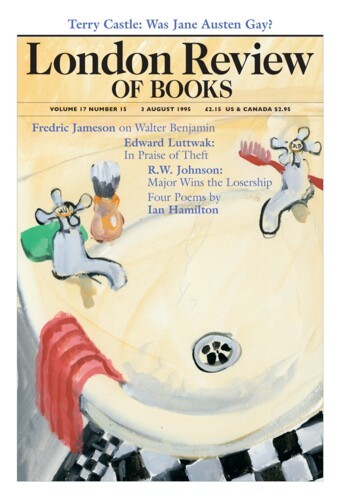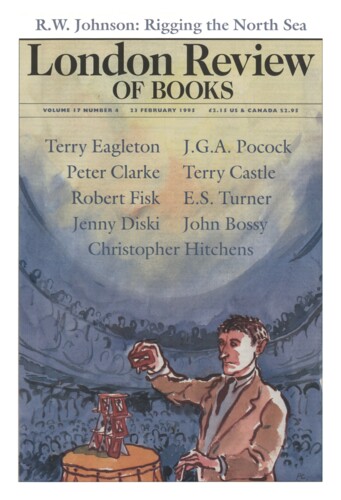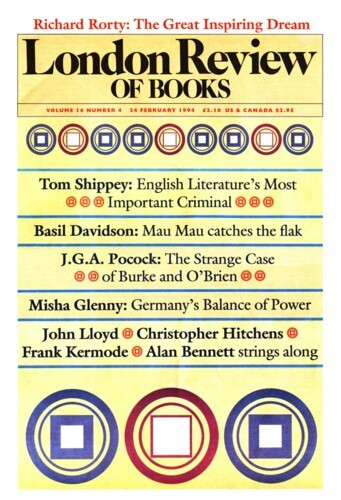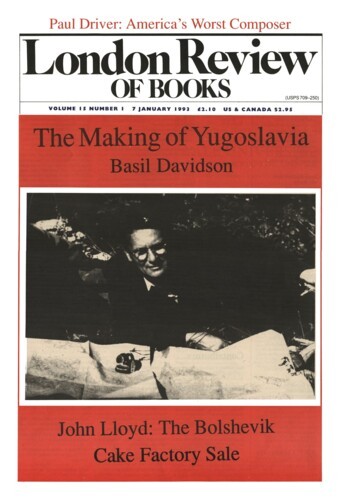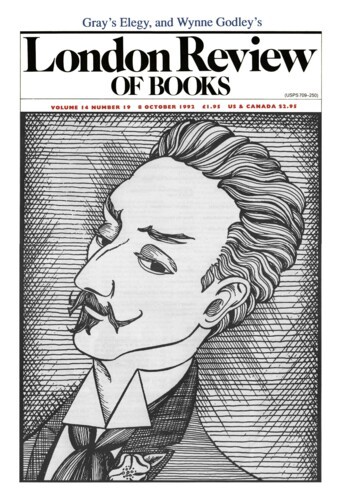J.G.A. Pocock
J.G.A. Pocock, who died in 2023 at the age of 99, taught for many years at Johns Hopkins. He was the author of The Ancient Constitution and the Feudal Law, The Machiavellian Moment: Florentine Political Thought and the Atlantic Republican Tradition, the six volumes of Barbarism and Religion, concerning Edward Gibbon’s Decline and Fall of the Roman Empire, and many other books about the history of political thought and about history as a kind of political thought. He wrote for the LRB on subjects including Edward Gibbon, Edmund Burke and Aotearoa New Zealand, where he grew up.
Was He One of Them?
J.G.A. Pocock, 23 February 1995
David Womersley’s massive and elegant edition of Gibbon is the better timed because it comes a century after the edition scholars have been obliged to use as the nearest to a critical text. It was in 1896 that J.B. Bury brought out the first volume of his edition, which he reissued in 1909 and which until now has been considered standard. We can therefore look back from Womersley to Bury, across a century of upheavals in both historiography and history, and wonder, Neoclassically, what will have become of both text and new edition when the next fin de siècle is on its way out. If there are readers then, and if they are reading Gibbon, they may not be Euro-Americans and may be integrating the Decline and Fall into histories of their own – if, again, they are so fortunate as to possess histories.’
The devil has two horns
J.G.A. Pocock, 24 February 1994
Conor Cruise O’Brien’s majestic study takes rise from two lines of Yeats:
What do we mean by it?
J.G.A. Pocock, 7 January 1993
This volume is one of a series. Professor Burns has already edited the Cambridge History of Medieval Political Thought: c. 250-c. 1450 (1988), Dr Goldie is to join with Robert Wokler in editing the Cambridge History of 18th-Century Political Thought, and a volume on the 19th century is to follow. These furthermore are ‘Cambridge histories’ in the classic sense, laid down by Lord Acton a century ago: general editors co-ordinate a series of chapters on related topics, each written by an authority in the field it defines. Academic culture today teems with multi-author volumes, many no more than the proceedings of particular conferences; and the problem which Burns and Goldie have confronted is that of seeing that their volume is more than a collection of loosely convergent essays. They have surmounted that problem, rather than solved it; their volume possesses coherence and unity, but as Professor Burns observes in his introduction, one can select a pattern of unity only in the knowledge that another, equally defensible pattern could have been selected. Since selection is inescapable, there can be no ‘solution’; and there is a sense in which no such thing as ‘the history’, even ‘the Cambridge history’, ‘of political thought’ can be said to exist until it has been selected and invented.
When the spear is thrown
J.G.A. Pocock, 8 October 1992
A society which seriously determines, or discovers, that it is a convergence of two cultures needs a history of two cultures; and since history is a product of culture, this means that it needs two histories, the history of two experiences and two ways of looking at history. This has been the case of New Zealand since it was realised – or since the realisation was forced upon the Pakeha – that the Maori remember a different history and, in consequence, remember history differently. Courageous and not unsuccessful attempts have been made – rather often by Pakeha historians – to give free play to the Maori awareness of history and attend to the voices in which it speaks. But the difficulties are only beginning at this point, since the very word ‘history’ – meaning, as it does, not an unprocessed past, but the activity of remembering and interpreting it – takes on culturally specific meanings, and may come to signify an awareness of experience peculiar to one culture and not to the other, capable of being used by the one to dominate, expropriate and assimilate the other. In the North American context, it has been argued that ‘history’ is an ideological tool whereby Anglo-American culture destroys the sense of unbroken cosmic unity peculiar to Native American cultures, and forces them to take part in processes of change and alterations of consciousness imposed by the invading majority; and it can even be suspected to the contrary that cosmic unity is an invention of the self-repudiating Western mind, imposed upon the Native cultures by Western dissent for purposes ultimately Western.’
Pieces about J.G.A. Pocock in the LRB
Europe, what Europe? J.G.A. Pocock
Colin Kidd, 6 November 2008
Few areas of the humanities have undergone such a remarkable transformation over the past half-century as the history of political thought. Students were once introduced to it by way of its...
Writing the History of Middle Earth: Edward Gibbon
Colin Kidd, 6 July 2000
Tall, silver-haired and bearded, with a mesmerising voice and beguiling manner of delivery, John Pocock has long struck me as the Gandalf of the historical profession. The range, altitude and...
No Trousers
Claude Rawson, 20 December 1990
Burke’s Reflections on the Revolution in France was published on 1 November 1790. By then, Burke had long ceased to be the dominant intellectual influence in the Whig Party. He hoped the...
Tory History
Alan Ryan, 23 January 1986
Demolish a much-loved building, and you are left with rubble. Demolish a much-loved piece of political theory, and you find it rising from its own ashes, somewhat changed in appearance, but...
Writing to rule
Claude Rawson, 18 September 1980
Was there such a thing as ‘Neo-Classicism’, outside the special sense of the term which art historians apply to a later period than the one over which students of literature lose so...
Read anywhere with the London Review of Books app, available now from the App Store for Apple devices, Google Play for Android devices and Amazon for your Kindle Fire.
Sign up to our newsletter
For highlights from the latest issue, our archive and the blog, as well as news, events and exclusive promotions.
